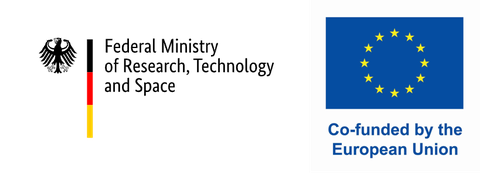Directive “Future of Value Creation"
Directives for the “Future of Value Creation” funding program within the framework of the “Future of Value Creation – Research on Production, Service and Work” program and October deadline for ESF Plus program “Future of Work”
The aim of this funding measure is to strengthen the innovative and competitive potential of small and medium-sized enterprises (SMEs) and to promote value creation in companies, for example through the use of robotics in new application areas.
Funding is available for projects that address issues in the area of entrepreneurial, competitive value creation from the various perspectives of the “Zukunft der Wertschöpfung” program.
Funded projects must focus on developing solutions that address aspects of business value creation. The following topics could be addressed:
- New and improved products, machinery and equipment for industrial production
- New manufacturing technologies and process chains
- New methods and tools for product development
- Improved product and process quality
- More flexibility in digitalization and virtualization of production and production systems (Industry 4.0)
- Organization and industrialization of production-related services
- Customer-related, novel and complex services and service systems
- New business models (e.g. monetization of data, block chain technologies, B2B platforms)
- New forms of collaboration in value networks and ecological systems
- News forms of work organization and structuring
- Preparing companies and employees for change processes
- Innovations for indirect branches (e.g. administration, human resources, sales) knowledge management and organization for production
- Increasing the skills and qualifications of the workforce, life-long learning
Funding is available for high-risk, pre-competitive and company-driven research, develop-ment and transformation projects, that build on cutting-edge research, have clear com-mercial, economic or social potential and whose complexity goes far beyond usual business activities.
In order to strengthen the objectives of the “KMU-innovativ: Zukunft der Wertschöpfung” initiative, the partners of the funded projects are expected to participate in a mutual exchange of experiences with other companies. Networking can take the form of cross-project industry working groups.
Small and medium-sized enterprises are eligible to apply. Universities and non-university research institutions are also eligible to apply as part of collaborative projects.
Individual projects from small and medium-sized enterprises (SMEs) with proven compe-tence in the value creation area addressed by the project are eligible for funding. If the task requires, funding is also available for collaborations between multiple companies and/or research institutes.
The projects should be coordinated by the company who, if the project is successful, will commercially exploit the results to a significant extent through a marketable solution.
The subsidy is granted within the framework of project funding as partial funding in the form of a non-repayable grant.
The funding period is usually two years, or up to three years for ESF co-financed projects.
For universities, research institutions and scientific institutions that are not engaged in economic activities, up to 100 % of eligible expenses can be funded. In addition, a lump sum amounting to 20 % of the planned expenses for each project is paid.
Project outlines can be submitted at any time. The evaluation deadlines for project outlines are April 15th and October 15th, 2023.
The October deadline for this funding measure is additionally part of the ESF Plus program “Future of Work” within the “Future of Value Creation – Research on Production, Service and Work” program (“Zukunft der Wertschöpfung – Forschung zu Produktion, Dienstleistung und Arbeit”). It is therefore reserved for drafts whose content focuses predominantly on non-technical innovations. Outlines submitted by this deadline must primarily make contributions to the following questions:
- Systemic and structural approaches to the development of new tools for work organization or design
- Impact on organizations, employees and value creation associated with the introduction of new technologies
- New concepts and models for a working environment and work organization conducive to learning
- Support for the transfer of required skills
The April deadline is reserved for outlines that do not focus on the topics listed above. These projects must focus on technical innovations and are not co-funded by ESF.
There is a two-stage application process. In the first stage, project outlines must be submitted via the “PT-Outline” web portal by the specified deadline. In the second stage, applicants who submitted positively evaluated project outlines will be invited to submit a formal funding application. Proposals must be submitted via the European Project Center (EPC).
- Personnel costs: Costs for researchers, technicians and other personnel
- Costs for tools and equipment
- Costs for contract research, knowledge and for patents acquired directly or under license from third parties in compliance with the arm's-length principle, as well as costs for consulting and equivalent services used exclusively for the project
- Additional overhead costs and other operating expenses (such as material, consumer goods and the like) that arise directly from the project
Contact at EPC:

Project Manager
NameMs Ines Synnatzschke
ESF, ERDF/JTF
Send encrypted email via the SecureMail portal (for TUD external users only).
Visiting address:
FAL Falkenbrunnen BT-A Würzburger Straße 35
01187 Dresden

